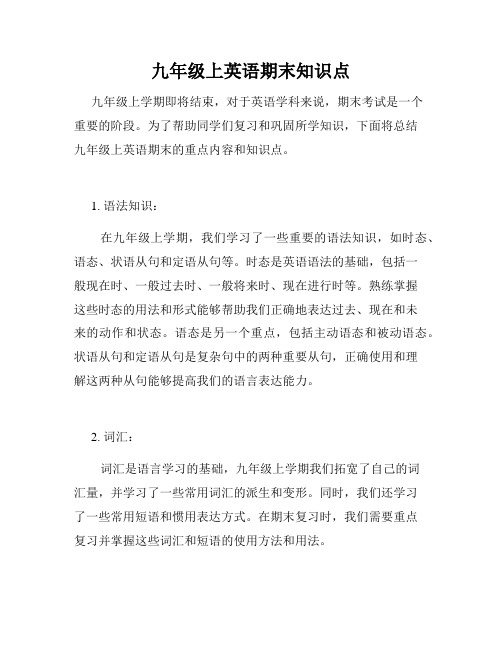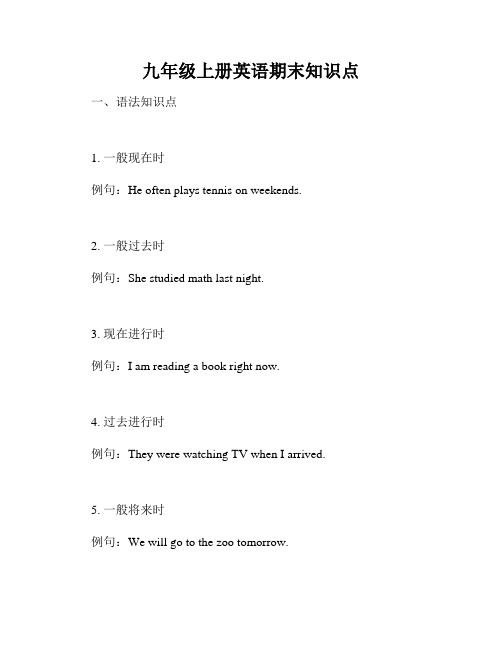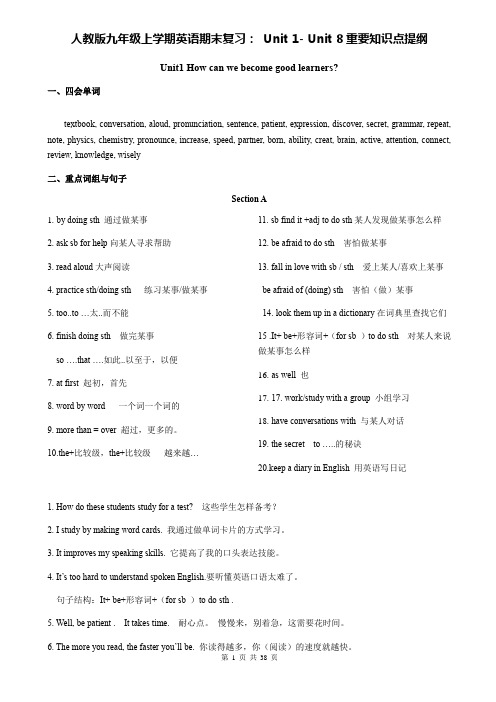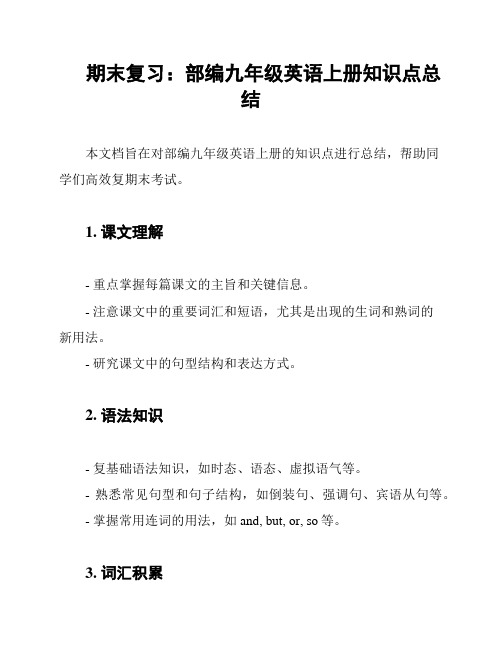初三英语上期末复习知识梳理解读
九年级上册英语知识点归纳总结

九年级上册英语知识点归纳总结本文将对九年级上册英语的知识点进行归纳总结,帮助同学们更好地复习和掌握这些知识。
以下是各个知识点的详细介绍:一、词汇与短语1. 常用动词和形容词:列举了一些常用的动词和形容词,例如:study(学习)、speak(说话)、interesting(有趣的)、difficult (困难的)等等。
2. 数词与日期:介绍了数字的表达方式和相关的日期表达方法,例如:one(一)、tenth(第十)、January 1st(1月1日)等等。
3. 颜色和描述事物的形容词:给出了一些颜色和形容词,帮助学生们描述事物的颜色和外观特点,例如:red(红色)、beautiful(美丽的)等等。
4. 学科名词与学校设施:介绍了一些学科的名称和学校的设施,例如:mathematics(数学)、computer room(计算机室)等等。
5. 职业名称:列举了一些常见的职业名称,例如:teacher(教师)、doctor(医生)等等。
二、语法知识1. 时态:总结了英语中常用的各种时态,包括一般现在时、一般过去时、一般将来时等等,并给出了相应的句子例子。
2. 名词与代词:讲解了名词的分类以及代词的使用方法,例如:可数名词、不可数名词、人称代词、指示代词等等。
3. 形容词与副词比较级与最高级:介绍了形容词和副词的比较级和最高级的构成方式,以及在句子中的使用方法。
4. 祈使句与感叹句:详细解释了祈使句和感叹句的语法结构和用法,并提供了相应的例句供学生进行理解。
5. 间接引语与直接引语:讲解了间接引语和直接引语的转换方式,并给出了具体的例子来说明。
三、阅读理解文章给出了一些阅读理解的策略和技巧,例如:快速浏览全文、仔细阅读问题、根据上下文推测答案等等。
四、听力与口语1. 听力技巧:提供了一些听力技巧,帮助同学们更好地理解听力材料,例如:注意听关键词、多听多练等等。
2. 口语练习:给出了一些口语练习的题目,帮助学生们提高口语表达能力,例如:介绍自己的家庭、描述一个城市等等。
九年级上英语期末知识点

九年级上英语期末知识点九年级上学期即将结束,对于英语学科来说,期末考试是一个重要的阶段。
为了帮助同学们复习和巩固所学知识,下面将总结九年级上英语期末的重点内容和知识点。
1. 语法知识:在九年级上学期,我们学习了一些重要的语法知识,如时态、语态、状语从句和定语从句等。
时态是英语语法的基础,包括一般现在时、一般过去时、一般将来时、现在进行时等。
熟练掌握这些时态的用法和形式能够帮助我们正确地表达过去、现在和未来的动作和状态。
语态是另一个重点,包括主动语态和被动语态。
状语从句和定语从句是复杂句中的两种重要从句,正确使用和理解这两种从句能够提高我们的语言表达能力。
2. 词汇:词汇是语言学习的基础,九年级上学期我们拓宽了自己的词汇量,并学习了一些常用词汇的派生和变形。
同时,我们还学习了一些常用短语和惯用表达方式。
在期末复习时,我们需要重点复习并掌握这些词汇和短语的使用方法和用法。
3. 阅读:阅读是英语学习中非常重要的一部分。
通过阅读,我们可以了解到不同的文化、社会、科学等领域的知识。
在这个学期,我们学习了一些阅读技巧和策略,如预测、扫读、略读和细读等。
复习时,我们可以通过大量的阅读练习来提高自己的阅读理解能力。
4. 写作:写作是英语学习中培养语言表达和思维能力的一个重要环节。
在九年级上学期,我们学习了一些常用的写作技巧和模板,如议论文、说明文和应用文等。
复习时,我们可以通过写作练习来提高自己的写作能力,同时也加深对所学语法和词汇的理解和运用。
5. 听力:听力是英语学习中培养听力理解和口语能力的一个重要方面。
在九年级上学期,我们通过大量的听力练习来提高自己的听力技能。
在期末复习时,我们可以多听一些听力材料,包括录音和视频,提高自己的听力理解能力和口语表达能力。
九年级上英语期末考试将对我们所学的知识进行全面的考察和评价。
在复习过程中,我们要充分利用课本和习题集等教材资源,同时也可以通过互联网上的一些学习网站或平台来进行有针对性的复习。
九年级英语期末知识点讲解

九年级英语期末知识点讲解英语作为一门重要的外语,对于学生来说是必修课程之一。
九年级是初中阶段的最后一年,期末考试是对学生所学知识的综合考查。
为了帮助九年级的同学们更好地复习英语,下面将对九年级英语期末考试的几个重要知识点进行讲解。
首先是语法部分。
在九年级英语中,学生需要掌握各种句子结构和时态的用法。
比如,直接引语和间接引语的转换,需要将说话人的话转述成间接引语,包括疑问句、陈述句和祈使句等。
此外,还需要掌握被动语态的构成和用法,了解主动语态和被动语态之间的区别。
时态的运用也是非常重要的,包括一般现在时、一般过去时、一般将来时、现在进行时和现在完成时等。
其次是阅读理解。
在九年级的英语考试中,阅读理解占据了相当大的比例。
同学们需要通过阅读文章来回答问题,理解文章的主旨和细节,并推测文章的隐含含义。
在阅读时,同学们可以运用一些技巧,如先读题目找到关键词,快速浏览文章,找出所需信息,再逐题查找答案。
第三是词汇量的积累。
词汇是学习一门语言的基础,掌握更多的词汇可以帮助同学们更好地理解和运用英语。
九年级的英语课程中,同学们需要学习和掌握大量的单词,包括动词、名词、形容词、副词等。
为了提高词汇量,同学们可以通过背单词卡片、听英语歌曲、看英文原版书籍等多种途径来积累词汇。
最后是写作能力。
写作是英语学习中的一项重要技能,也是考试中常见的题型之一。
九年级的同学们需要学会用正确的语法结构和合适的词汇来表达自己的意思。
写作时,同学们可以提前准备一些模板句子和短语,以帮助他们更好地组织语言。
此外,要注意写作中的段落结构和语法准确性,以及合理使用连接词和过渡词,使文章更连贯。
总之,九年级英语期末考试需要同学们全面、系统地掌握所学知识,并运用到实际的听、说、读、写中。
语法、阅读理解、词汇量和写作能力是考试重点,同学们可以通过充分理解和练习,提高自己的英语水平。
同时,平时在课堂上积极参与、多与同学们交流,也能够帮助加深对英语知识的理解和记忆。
九年级上册英语期末知识点

九年级上册英语期末知识点一、语法知识点1. 一般现在时例句:He often plays tennis on weekends.2. 一般过去时例句:She studied math last night.3. 现在进行时例句:I am reading a book right now.4. 过去进行时例句:They were watching TV when I arrived.5. 一般将来时例句:We will go to the zoo tomorrow.6. 现在完成时例句:Have you ever been to Paris?7. 过去完成时例句:She had already eaten when I got home.8. 情态动词 can,could,may,might,must,should,would 例句:You should finish your homework before going out.9. 被动语态例句:The book was written by a famous author.10. 定语从句例句:The girl who is sitting over there is my sister.11. 名词性从句例句:What he said made me happy.12. 直接引语和间接引语例句:She said, "I love ice cream." → She said that she loved ice cream.二、词汇知识点1. 动词短语例句:give up,take off,turn on,look after2. 名词短语例句:a piece of cake,a cup of tea,a pair of shoes,a bottle of water3. 形容词和副词例句:happy,beautiful,quickly,carefully4. 介词短语例句:in front of,on top of,at the end of,by the river5. 时间和日期词汇例句:Monday,January,tomorrow,next week6. 数字和数量词例句:three,fifty,many,few7. 情感词汇例句:excited,angry,nervous,proud8. 学科词汇例句:math,science,history,geography三、阅读技巧1. 主旨大意题解题技巧:通读全文,找出文章的中心思想或主题。
九年级上册英语知识点汇总

九年级上册英语知识点汇总本文将汇总九年级上册英语的知识点,方便同学们进行学习和复习。
以下是各个模块的知识点总结:一、语法知识1. 一般现在时:表示经常性的动作、习惯或客观事实。
2. 一般过去时:表示过去发生的动作或状态。
3. 现在进行时:表示现在正在进行的动作。
4. 过去进行时:表示过去某个时刻或一段时间内正在进行的动作。
5. 一般将来时:表示将来发生的动作或状态。
6. 情态动词:表示能力、可能性、许可、意愿等。
7. 被动语态:表示动作的接受者重要于执行者。
8. 直接引语和间接引语:转述别人说过的话。
9. 名词性从句:用作主语、宾语、表语或同位语的从句。
10. 定语从句:修饰名词或代词的从句。
二、词汇知识1. 动词短语:由动词和副词或介词组成的短语。
2. 名词性短语:由名词、代词或动名词构成的短语。
3. 形容词性短语:由形容词或副词构成的短语。
4. 副词性短语:由副词构成的短语。
5. 介词短语:由介词和名词、代词或动名词构成的短语。
6. 连词短语:由连词构成的短语。
三、听力技巧1. 根据听到的对话内容选择正确的答案。
2. 根据听到的问题选择正确的答案。
3. 根据听到的对话或独白填写所缺的信息。
四、阅读技巧1. 根据短文内容选择正确的答案。
2. 根据短文内容判断句子正误。
3. 根据短文填写所缺的词语。
4. 根据短文回答问题。
五、写作技巧1. 根据给定的提示写一篇短文。
2. 根据给定的图片写一篇短文。
3. 根据所给的问句写一篇短文。
六、口语表达1. 日常生活用语:问候、道谢、邀请、购物等。
2. 交通、饮食、购物、旅行等场景中的口语表达。
3. 描述人物或事物的外貌、性格、习惯等。
七、阅读理解1. 根据短文内容选择正确的答案。
2. 根据短文内容判断句子正误。
3. 根据短文填写所缺的词语。
4. 根据短文回答问题。
八、短语和固定搭配1. 动词短语:例如:break up, carry out, put off等。
九年级上册英语知识点归纳总结

九年级上册英语知识点归纳总结一、基础知识点1. 时态:九年级上册英语中,主要涉及到的时态包括一般现在时、一般过去时、一般将来时、现在进行时、过去进行时、将来进行时、现在完成时、过去完成时、将来完成时等时态。
学生要掌握这些时态的用法,在交流中正确使用。
2. 句型:九年级上册英语中,涉及到的句型有很多。
例如,陈述句、疑问句、祈使句、感叹句等。
学生要学会根据不同的语境使用不同的句型。
3. 单词拼写:九年级上册英语会出现很多新的单词,学生需要记住这些单词的拼写和发音,并能够正确运用到句子中。
4. 词汇:九年级上册英语中,会学习到很多新的词汇,包括名词、动词、形容词、副词、代词等。
学生需要掌握这些词汇的意思和用法。
5. 语法:九年级上册英语中,会学习到很多重要的语法知识点,包括但不限于:情态动词、被动语态、倒装句、虚拟语气、宾语从句、定语从句等。
学生需要系统学习这些语法知识点,并能够正确运用到句子中。
二、听力技巧1. 倾听重点信息:在听力考试中,有一些关键的信息是用来回答问题的,学生需要仔细倾听这些重点信息。
2. 推测上下文:在听力材料中,有一些信息是没有直接给出的,学生需要通过上下文来推测这些信息。
3. 注意连读和弱读:英语中有很多连读和弱读的现象,学生需要特别注意这些现象,以免造成误解。
4. 多听多练:听力是需要长期积累的,学生可以多听一些英语材料,进行多次练习,提高自己的听力能力。
三、阅读技巧1. 浏览全文:在阅读文章之前,学生需要先浏览全文,了解文章的主题和结构,为后面的阅读做好准备。
2. 找关键词:在阅读文章时,学生需要注意找关键词,这些关键词有助于理解文章的内容。
3. 猜测词义:在阅读文章时,学生会遇到一些生词,这时可以通过上下文来猜测这些生词的意思。
4. 注意细节:在阅读文章时,学生需要注意细节,不要错过文章中的重要信息。
5. 多读多练:阅读是需要积累的,学生可以多读一些英语文章,进行多次练习,提高自己的阅读能力。
人教版九年级上学期英语期末复习: Unit 1- Unit 8 重要知识点提纲(全面!)

人教版九年级上学期英语期末复习:Unit 1- Unit 8重要知识点提纲Unit1 How can we become good learners?一、四会单词textbook, conversation, aloud, pronunciation, sentence, patient, expression, discover, secret, grammar, repeat, note, physics, chemistry, pronounce, increase, speed, partner, born, ability, creat, brain, active, attention, connect, review, knowledge, wisely二、重点词组与句子Section A1.by doing sth 通过做某事2. ask sb for help向某人寻求帮助3. read aloud大声阅读4. practice sth/doing sth 练习某事/做某事5. too..to …太..而不能6. finish doing sth 做完某事so ….that ….如此..以至于,以便7. at first 起初,首先8. word by word 一个词一个词的9. more than = over 超过,更多的。
10.the+比较级,the+比较级越来越… 11. sb find it +adj to do sth某人发现做某事怎么样12. be afraid to do sth 害怕做某事13. fall in love with sb / sth 爱上某人/喜欢上某事be afraid of (doing) sth 害怕(做)某事14. look them up in a dictionary在词典里查找它们15 .It+ be+形容词+(for sb )to do sth 对某人来说做某事怎么样16.as well 也17.17. work/study with a group 小组学习18.have conversations with 与某人对话19. the secret to …..的秘诀20.keep a diary in English 用英语写日记1. How do these students study for a test? 这些学生怎样备考?2. I study by making word cards. 我通过做单词卡片的方式学习。
期末复习:部编九年级英语上册知识点总结

期末复习:部编九年级英语上册知识点总
结
本文档旨在对部编九年级英语上册的知识点进行总结,帮助同
学们高效复期末考试。
1. 课文理解
- 重点掌握每篇课文的主旨和关键信息。
- 注意课文中的重要词汇和短语,尤其是出现的生词和熟词的
新用法。
- 研究课文中的句型结构和表达方式。
2. 语法知识
- 复基础语法知识,如时态、语态、虚拟语气等。
- 熟悉常见句型和句子结构,如倒装句、强调句、宾语从句等。
- 掌握常用连词的用法,如and, but, or, so等。
3. 词汇积累
- 复部编九年级英语上册中出现的重要单词和短语。
- 研究单词的词形变化和词义辨析。
- 使用单词和短语进行句子练,加强语法和词汇的运用。
4. 阅读理解
- 掌握阅读理解的技巧,如快速浏览、找关键词、理解文章结
构等。
- 注意文章中的关键句和细节,尤其是题目要求的信息。
- 练不同类型的阅读理解题目,如选择题、填空题、配对题等。
5. 写作技巧
- 研究不同类型的写作任务,如说明文、议论文、表达观点等。
- 熟悉写作的组织结构和段落发展。
- 提高写作时的词汇量和语法运用能力。
以上是部编九年级英语上册的复习知识点总结,希望对同学们
的期末考试备考有所帮助。
祝大家取得优异的成绩!。
- 1、下载文档前请自行甄别文档内容的完整性,平台不提供额外的编辑、内容补充、找答案等附加服务。
- 2、"仅部分预览"的文档,不可在线预览部分如存在完整性等问题,可反馈申请退款(可完整预览的文档不适用该条件!)。
- 3、如文档侵犯您的权益,请联系客服反馈,我们会尽快为您处理(人工客服工作时间:9:00-18:30)。
初三英语上期末复习知识梳理解读初三英语上期末复习知识梳理:基础知识:1. such as +动名词例如: I have a lot of hobbies, such as playing football, playing basketball and so on.2. instead of 代替例如:We have to study hard instead of having a rest.3. feel 的过去式felt, fall 的过去式fell, teach----taught, catch----caught,cost---cost, tell---told, talk---talked,mend---mended, lend---lent, write---writing, wrote, written, run----running, begin----beginning, lie----lying, listen----listening, snow-----snowing, wait---waiting,4. 我和汤姆翻译成Tom and I5. 是我们的梦想成真译成 make our dream come true. (注意true 别写成ture6. 冠词 an orange orange, an English book, an egg, an apple, an American girl, an hour, a birthday cake, an evening party,a useful dictionary, a university, an important date,7. 做运动是非常重要的。
译成Doing sports is very important.8. I think playing computer games is very cool.我认为玩电脑很爽。
9. 请你给我带个口信好吗? Will you please take a message for me?注意message 别写成massage.我可以留个口信吗? May I leave a message?我能给她带个口信吗? Can I give a message to her?10. 有although 不能有but11. 未能做某事 fail to do sth.12. 描写身体健康用health 表示。
health 的比较级healthier13. 我希望你的身体会越来越健康。
I hope you will be healthier and healthier.14. spend ….doing sth. /spend….on sth./ pay for/ cost/It takes sb. st. to do sth.区别15. 越来越……. 表达 -er and –er (单音节);more and more +多音节的原形越来越美丽译成 more and more beautiful,越来越短译成 shorter and shorter, 其他的还有 bigger and bigger, smaller and smaller越……越…… the +比较级, the +比较级the more, the better越多越好The more knowledge you get, the better you will be.知识越多你越优秀。
16. 词语辨析● work out解决,解答,计算出 2leave out遗漏, 省略, 删去; 未顾及, 忽略3give out分发; 散发2. 公布; 宣布3. 耗尽; 用完4. 停止起作用5.停止运行;停止运转4keep out(使留在外面2. 扣留; 保留, 留下.●1only if表示" 只有" ;if only则表示" 如果……就好了" 。
2 as for 1.至于; 关于2. 至于,就... 方面说 ●too much+不可数名词, much too+形容词或者副词原形例如much too difficult ●bring, fetch去取, take的区别 ●take a bus, by bus, ride a bike, by bike 我是坐公交车去的天津。
I went to Tianjin by bus. I took a bus to Tianjin. ●little, a little, few, a few的区别 ●other, the other, another, others的区别 one after another, help each other, learn from each other, some….others,one …… the other ●through, although, though, tough, ●cross, across 例如:cross the road, walk across the road, walk through the street, go through the forest ●above, over, on例如:above zero, fly over, go over, on the table ●lend, borrow, keep例如lend sth. to sb=lend sb. sth., borrow sth from …., keep the book for two weeks ● 点动词变成延续性动词(点动词不能用在有时间限制的完成时里,点动词要变成延续性动词leave---be away, join-----be, die----be dead, begin----be on, buy-----have,lend/borrow---keepmake----be例如: I have kept this book for two months. 我已经借了这本书两个月了。
I have been friends for seven years.● been to, been in, gone to● get to, arrive in/ at, reach● between, among● in, on, atin spring, autumn, winter, summer/1980/ May/ March; in the evening, in the morning, at noon, at nightthe boy in a white shirt, hit him in the face,at home, at the table, at lunch time, at 7 o’clock, in surpriseon the morning of September 9th , 2003in the morning, on September 9th , 2003in the sun,● He doesn’t know what to do. / He doesn’t know how to get to the Tian’anmen Square.● and, but, or, so● hope to do, hope that+句子● Thanks to由于,多亏了; Thanks for doing sth.例如Thank you for inviting me.● That ’s right; That’s all right; All right; That’s OK.● how long, how often, how soon, how many, how much, how old● h ang, hanged, hung, hang on● since 3 days ago= for 3 days● people, person● There is going to a meeting this afternoon./ We are going to hold a meeting this afternoon.● except 除…. 之外, besides除了….. 外,还有, expect期待,预计,exactly相当的● as well as, also, too, ei ther, neither● already, yet● There ’s something wrong with…/ Something is wrong with… / What’s wrong with…● listen to/ hear/ see sb. do/ doing sth.● for a long time, several times, two times= twice● do well in/ do one’s homework/ do shopping● sometim es 有时候, some times几次, some time某段时间, sometime某个时间例如:I hope to be an astronaut sometime in thefuture.我希望将来的某一时刻成为宇航员。
● not …at all, in all, above all, all of, all overI don’t like painting at all.我一点也不喜欢画画。
● get to, get in, get up, get out, get off, ge t on,● be made of, be made from, be made in● be used to doing习惯于做某事, used to do过去常常, be used fordoing用于做…….● hear of= hear about听说, hear from收到…来信,● be worried about=worry about● be angry with; agree with● developed, developing● keep fit=keep healt hy; It fits me well. 很适合我。
● a lot, a lot of, lots of 例如help a lot, thanks a lot, a lot of tomatoes, lots of photos,● never mind, not at all, you’re welcome, it doesn’t matter● no more=not…any more, no longer=not….any longer● hundreds of, one hundred, t housands of, millions of,● so …that / too….to● catch up with, keep up with, come up with, keep in touch with,● set off, put off, take off, turn off●do with, play with, be covered with, be full of, be filled with ●What are you going to cook for?=Why a re you going to cook? ●try on, try out, have a try ●break the news公开发布新闻, break into闯入, break out爆发 have a 休息一下be broken, ●send sb sth.=send sth. to sb. 寄给某人某物 send for a doctor派人去请医生 ●think of认为,think about考虑 ●voice, sound, noise ●take a bath, take a look, take down, take care of, take away, take in, take out, take up ●on one’s way home, way out, by the way, in this way ●stay up, give up, pick up, stand up, wake up, turn up, ●look up, look over, look down, look after, look for, look through, look at, look like, look forward to, look out, ●fall down, fall ill, fall over, fall off, fall asleep, fall in love with ●every day, everyday 例如everyday English日常用语 Mary enjoys speaking Japanese every day. ●care for, depend on, think over, make sure, find out, give in, give out, give away, ●What happened? What’s happening? ●long before, soon after, even though, ever since, ●half an hour, two and half hours, a quarter=15 minutes, second秒, one and a half hours=an hour and a half ●family name, given name ●make good progress in; teach sb. to do sth; ●needn ’t do sth, need to do sth. ●be proud of, take the pride of 17. 主谓一致:●The family are having supper now./ Tom ’s family is having supper now. ●The Greens are sitting under the tree. ●Not only Tom but a lso our friends have been to the Great Wall. ●Both Peter and Mike are League members. ●Neither Sally nor Bill has paid for dinner. ●There is a pen, two pencils and a ruler in his pencil-box. ● Ten years has passed already. ● Either you or he went to see a film yesterday.18. 1 She is a twelve-year-old girl. 2 The girl named Betty is my sister.19. It ’s + adj for sb. to do sth. / It’s adj of sb. to do sth.的区别20. find it +adj to do sth.例如:I find it difficult to practise playing the piano.21. 动名词归纳:stop doing, forget doing, be used to doing, remember doing, look forward to doing, mind doing, practisedoing, suggest doing, prefer doing to doing, like doing, enjoy doing, finish doing, keep doing, There are sb. doing sth., stop sb. from doing sth., be worth doing, can ’t help doing, be busy doing, prevent sb. from doing sth., make a contribution to doing,keep sb. away from doing sth, avoid doing, be afraid of doing, feel like doing sth., What/How about doing, be interested in doing sth, go shopping, do some cleaning,22. 动词不定式 tell sb. to do sth, ask sb. to do sth, stop to do, You’d better do, encourage to do, hope to do, would liketo do, want to do, make sb. do, get sb. to do, have sth. to do, Why not do, Will you please do sth., prefer to do rather than do, warn sb. to do sth, be allowed to do sth, be afraid to do sth.否定形式 tell sb. not to do sth. (not 是不变的)例如:My teacher often tells me not to leave anything when I leave home.23. go home, leave school, come here, go there,24. With pleasure.= It’s pleasure.很乐意。
